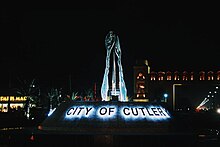Wazirabad (Urdu/Punjabi: وزیر آباد) is a city in Punjab, Pakistan. It is the capital of Wazirabad District (formerly a Tehsil of Gujranwala District).
Wazirabad
وزیر آباد | |
|---|---|
City | |
 Tomb of Maulana Zafar Ali Khan
 | |
| Coordinates: 32°26′7″N 74°6′51″E / 32.43528°N 74.11417°E | |
| Country | |
| Province | |
| Division | Gujrat |
| District | Wazirabad |
| Tehsil | Wazirabad and Ali Pur Chattha |
| No. of Union Councils | 12 |
| Municipal status | 1867 |
| Area | |
| • City | 83 km2 (32 sq mi) |
| • Metro | 1,206 km2 (466 sq mi) |
| Elevation | 215 m (705 ft) |
| Population | |
| • City | 128,060 (see page 79 of 98 for population of Wazirabad City per 2,017 Census of Pakistan)[1] |
| • Metro | 830,396 (Population of former Wazirabad Tehsil now called Wazirabad District in 2,023)[1] |
| Demonym | Wazirabadi |
| Time zone | UTC+5 (PST) |
| • Summer (DST) | UTC+6 (PDT) |
| Postal code | 52000 |
Famous for its cutlery products, it is known as the city of cutlery and is also quite famous for its foods.
Wazirabad is situated on the banks of the Chenab River nearly 100 kilometres north of Lahore on the Grand Trunk Road. It is 45 kilometres from Sialkot, 30 kilometres from Gujranwala, and about 12 kilometres from Gujrat. The city of Wazirabad is the headquarters of former Wazirabad Tehsil (now called Wazirabad District in 2023), an administrative subdivision of the district, the city itself is subdivided into 12 Union Councils.[3]
History edit
The city was founded by Wazir Khan, the governor and later, Grand Vizier of Mughal Emperor Shah Jahan in 17th century. The town was taken over by Charat Singh around 1760 together with other towns in the district. Maharaja Ranjit Singh occupied the town in 1809 and Avitabile was appointed as the Nazim of the city. In 1855, Jarral Rajputs of Rajouri Own Saman Burj Wazirabad ruled Wazirabad as a royal family. He built an entirely new town, with a straight broad bazaar running through it, and side streets at right angles.[4]
British rule edit
During British rule Wazirabad was the headquarters of the old Wazirabad District, broken up in 1851-2, and was the site of a military cantonment moved to Sialkot in 1855.[citation needed]
The municipality was created in 1867, the population, according to the 1901 census, was 18,069. The income during the ten years ending 1902-3 averaged Rs. 20,800, and the expenditure Rs. 21,400. In 1903-4 the income was Rs. 20,800, chiefly from octroi; and the expenditure was Rs. 19,200. The town had a considerable trade in timber, which comes down the Chenab from Jammu territory.[4] The smiths of Wazirabad had a reputation for the manufacture of small articles of cutlery, and the town of Nizamabad within a mile of the town is famed for its weapons. Wazirabad was an important junction on the North-Western Railway, as the Sialkot-Jammu and Lyallpur lines both branch off of here.[5]
The Chenab river is spanned opposite Wazirabad by the Alexandra railway bridge, one of the finest engineering works of the kind in India, which was opened in 1876 by Edward VII the King-Emperor when he was Prince of Wales. The town possessed two Anglo-vernacular high schools, one maintained by the Church of Scotland Mission, and a government dispensary.[5]
Colleges and universities in Gujranwala edit
Notable residents edit
- Abdul Mannan Wazirabadi, Islamic scholar
- Fazal Ilahi Wazirabadi, Islamic scholar and freedom fighter
- Hamid Nasir Chattha, former Speaker of the National Assembly of Pakistan
- Iftikhar Cheema, Retired Justice and Member National Assembly for 3 tenures
- Zulfiqar Ahmad Cheema, Ex IG National Highways and Motorway Police
- Nisar Ahmed Cheema, Ex-DG Health Punjab and Member National Assembly
- Jawwad S. Khawaja, 23rd Chief Justice of Pakistan
- Atif Aslam, singer
- S. A. Rahman, fifth Chief Justice of Pakistan
- Shaikh Nazrul Bakar, civil servant
- Noon Meem Rashid, a progressive poet
- Munnu Bhai, writer
- Razia Butt, writer
- Krishan Chander, writer
- Maulana Zafar Ali Khan, writer, poet, and journalist
- Mohammad Abdul Ghafoor Hazarvi: Muslim theologian, orator and revivalist leader
- Mazhar ul Islam, writer
- Raja Mehdi Ali Khan (film songs lyricist)
- Allah Bakhsh (painter-artist)
References edit
- ^ a b "Gujranwala District - Population Detail Blockwise (Wazirabad City and Tehsil used to be part of Gujranwala District per the Census of Pakistan in 2017)" (PDF). Pakistan Bureau of Statistics, Government of Pakistan website. Archived from the original (PDF) on 8 May 2018. Retrieved 13 December 2023.
- ^ "PAKISTAN: Provinces and Major Cities". Citypopulation.de website. Retrieved 13 December 2023.
- ^ "Tehsils & Unions in the District of Gujranwala". National Reconstruction Bureau, Government of Pakistan website. Archived from the original on 28 April 2012. Retrieved 13 August 2023.
- ^ a b "Wazirabad". Imperial Gazetteer2 of India, Volume 24, page 378 -- Imperial Gazetteer of India -- Digital South Asia Library.
- ^ a b "Wazirabad". Imperial Gazetteer2 of India, Volume 24, page 379 -- Imperial Gazetteer of India -- Digital South Asia Library, University of Chicago.
Further reading edit
- Bailey, Thomas Grahame (1904). Panjabi Grammar: A Brief Grammar of Panjabi As Spoken in the Wazirabad District (in English and Punjabi). Lahore, Pakistan: Punjab Government Press / World Digital Library.

